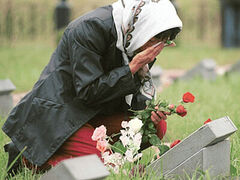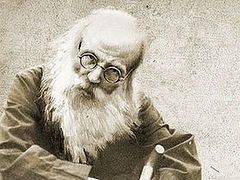A talk with the faithful of the Metropolis of Limassol, September 28, 2022, on 2 Cor. 7:5-13
Last time we spoke about the experiences of the Apostle Paul and his concern for his flock in Corinth, which had a host of various problems. Therefore, he reprimanded and instructed them as a father, teaching them the love of Christ, how to be with Christ, and how to make their hearts the home of the Holy Spirit. Further, he shows us that the Holy Apostles themselves endured various human hardships:
For, when we were come into Macedonia, our flesh had no rest, but we were troubled on every side; without were fightings, within were fears. Nevertheless God, That comforteth those that are cast down, comforted us by the coming of Titus; And not by his coming only, but by the consolation wherewith he was comforted in you, when he told us your earnest desire, your mourning, your fervent mind toward me; so that I rejoiced the more (2 Cor. 7:5-7).
Thus, the Apostle Paul went to Macedonia, but found no rest there, because he and his disciples met difficulties and sorrows everywhere and were troubled on every side (2 Cor. 4:8). Wherever they went, sorrows found them, and only God could comfort them. But, as you can see, sometimes God hides His grace in difficult hours—and man remains alone, to labor, to struggle, to endure, to manifest his strength, his boldness before God. After all, we ourselves often don’t know our capabilities, and it becomes clear how much we can endure only after going through temptations.
Many people have many temptations and sorrows. And if you ask a man before he’s visited by this sorrow: “Could you endure this?” he would say: “No way.” For example, when someone loses a loved one—before it happens, just thinking about how it could happen, he would say: “I’d go crazy from such grief.” But when this sorrow comes, he finds the patience and strength to bear it, which, of course, is given him by the Lord. But sorrows remain sorrows—man can’t endure grief and not be sorrowful. And even the Holy Apostles, as you see, were troubled on every side. The Lord Himself allowed these sorrows to happen that the Apostles might always have the grace of God in their hearts. When we hear that the Apostles also had to endure sorrows, it can be a comfort for us during our sorrows.
He goes on to say: Without were fightings, within were fears (2 Cor. 7:5). Here the Apostle Paul notes that the Church is attacked from outside, that is, we’re attacked by those outside the Church—heretics, non-Christians, and many other dark forces. But also, he says there are internal fears, internal dangers, that is, what happens between us Christians. After all, the Church is made up not only of priests and bishops, but all of us together—the laity and the clergy—make up the Church. Thus, there are “fears” between us that torment us, that afflict us, that create problems between us. We often ask: “What’s going on with the Church? What will happen next?” But we can’t answer this question, so we remain silent and put everything in God’s hands.
Nevertheless God, That comforteth those that are cast down, comforted us by the coming of Titus (2 Cor. 7:6), the Apostle goes on to say. God comforts us, not people. With all this, however, people can also give us comfort. And here the Apostle says that God comforted us by the coming of Titus. Titus was the Apostle Paul’s favorite disciple, who later became a bishop on the island of Crete. He went and met the Apostle Paul, and he felt great comfort thanks to Titus’ presence. Someone may ask if such a great Apostle really needed human consolation. But, as you can see, he did.
Human comfort is important; it’s necessary. We, people, need consolation from people. Like Christ, when He was on the Cross and wanted to drink, not a single person could be found who could give Him some small consolation. We have to remember this for this reason. There may come a moment in our life when we’ll also be in need of some human comfort or someone else will need our comfort. We have to know that it’s not enough just to say: “I’m praying for you,” but we have to look to see how we can practically comfort this person. The Apostle Paul says in one of his epistles: If someone comes to you and says he’s starving, will you really just say to him: “Okay, go. I’ll pray for God to feed you?” Prayer is good, of course, but man won’t be satisfied with one prayer, therefore we have to comfort a man in practice. We have to be comforters for our brothers, and then God will comfort us too when we’re in need. And even when there is no consolation from people (however cruel it may sound, such situations can happen), then God comforts us with His power and His presence.
There was a priest who went to another priest to ask for help. He told him: “Listen, Father, I can’t help you, but I’ll serve a moleben for the Lord to help you. He’s greater than me and He has greater power to comfort you.” The priest who was in need received these words and silently walked home. Two years passed, and the priest who had served the moleben found himself in need. He went to that other priest and asked for his help. He told him: “I’ll serve a moleben for you now.” A moleben is a good thing, of course, but comfort should be tangible. If a man needs help, this help should be palpable. It’s not enough just to pray, which only we and God see while others don’t. Of course, the saints often did this, but they did it because they had no possibility of doing anything else. But we, who have the ability to help others, should do it through the practical manifestation of help. And so here, the Apostle Paul was comforted by God through the presence of Titus.
I remember one time when we were in Katounakia, we were talking with St. Ephraim of Katounakia, and he said: “I’m tired. I’d like to go to Monoksilit Cell, to change the situation a little bit, change the view—all I see here are rocks.” This made a strong impression on me then: Such a great saint, a hesychast, a model of noetic prayer, wants to go see something else… Even such people had normal human desires.
I had a friend, a hermit, who went to live in the Kapsala desert, where he lived in complete seclusion. One winter, when it had snowed quite a lot, it got pretty hard to get around, and all the hermits found themselves completely isolated from others. And this hermit said: “If only I had at least a little kitten here, it would be a comfort for me.” A little while later, he heard some meowing outside the door. Thus the Lord comforted him. As we can see, normal human desires aren’t foreign even to the saints and other great Church personalities. They also need simple human consolation so that when others come to them for help, they can understand them and help them.
And not by his coming only, but by the consolation wherewith he was comforted in you, when he told us your earnest desire, your mourning, your fervent mind toward me; so that I rejoiced the more (2 Cor. 7:7).
The Apostle Paul says that they were comforted not just by the fact that Titus was there, but also by the fact that Titus brought them good news. He said that the Christians from Corinth were doing well now and that they were very worried for the Apostle. They wept and asked God to help him. The Apostle Paul told them that he was glad for the zeal that they showed in praying for him. Of course, the holy Apostle Paul didn’t need this zeal from the Corinthians, but the Christians themselves needed it so as to maintain the connection with their spiritual father. Our spiritual fathers rejoice when they see that we love them, not because they need us to love them, but because they see we receive some spiritual benefit from it.
For though I made you sorry with a letter, I do not repent, though I did repent (2 Cor. 7:8). The Apostle Paul wrote an epistle to the Corinthians where he scolded them, and then he was upset that he scolded them. This epistle probably hasn’t been preserved, or perhaps it’s about 1 Corinthians. The Apostle says he doesn’t regret that that he upset them, because he was treating them like a father. A father or teacher can upset his children by restricting them so that they become good students, good children, good people for society. But whatever it was, those who brought this grief are also upset. “…For I perceive that the same epistle hath made you sorry, though it were but for a season (2 Cor. 7:8). The Apostle says that his epistle to the Corinthians upset them only for a while, not forever, as everything temporary passes. We can be upset for a while, but then rejoice forever. Or we can rejoice while in sin, temporary and transitory, and then we’ll grieve forever, being separated from God.
Now I rejoice, not that ye were made sorry, but that ye sorrowed to repentance (2 Cor. 7:9). Such is the sorrow that leads to God. In this lies the difference between the sorrow of this world and the sorrow that brings a man nearer to God, that leads him to eternal life. Worldly sadness kills us. It’s born from our egotism, from endlessly asking, “Why?” While a humble person will say: “Okay, I’ve made so many mistakes, I’m weak, sinful, and insignificant; I don’t expect anything good from myself and I only ask God for forgiveness, humility, and repentance.” Even if such a man is grieving, he’ll have internal consolation, whereas worldly sorrow will lead us to despair, despondency, and a nervous state. There’s no joy in such sadness. We asked St. Paisios once what the difference was, and he told us: “Worldly sorrow contains darkness, but Godly sorrow has an inner light.” It may be a great sorrow, but it will have light and comfort in it; it will bring a man peace.
For ye were made sorry after a godly manner, that ye might receive damage by us in nothing. For godly sorrow worketh repentance to salvation not to be repented of: but the sorrow of the world worketh death (2 Cor. 7:9-10). Remember these words well. Sorrow for God’s sake brings a man joy, repentance, salvation, deliverance, peace, tranquility. A man weeps, grieves, sorrows, and suffers because of his position and because of his sins, but inwardly he has joy. This is what the Holy Fathers call “joyful sorrow:” joy and sorrow together, whereas the sorrow of the world worketh death. Worldly sorrow kills the human soul, therefore the man gets sick, his nervous system wears out, he loses his mind and begins to do bad things. Therefore, we must be wary of worldly sorrow, because it leads us to a dead end and doesn’t give any consolation at all. There are people who have caused themselves much harm and have suffered a lot because of this worldly sorrow. I don’t mean people with medical problems, but those who suffer from their egotism, who don’t accept the fact that they’re just people and can make mistakes. It’s a great thing to be able to say: “I’m just a man and I make mistakes, but I repent of them and ask God to forgive me.”




